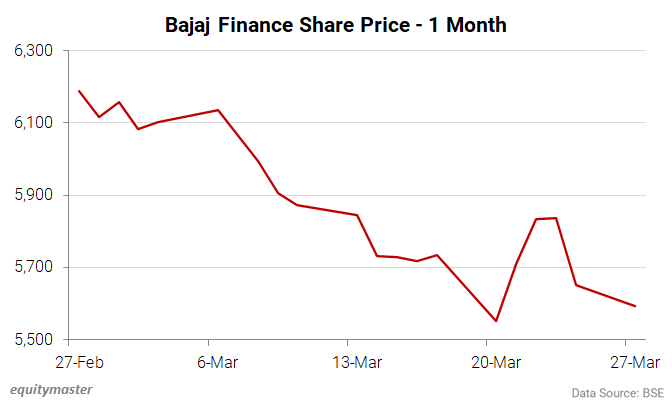India's Third Giant Leap
This Could be One of the Biggest Opportunities for Investors
- Home
- Views On News
- Mar 28, 2023 - Why Bajaj Finance Share Price is Falling
Why Bajaj Finance Share Price is Falling

Shares of Bajaj Finance fell for the second consecutive session yesterday, leaving investors jittery in a volatile market.
With the ongoing correction, the market cap of Bajaj Finance has slipped by 90 billion (bn) to Rs 3.3 trillion (tn) in a matter of ten days.
The stock has faced similar declines in the past too. In 2022, Bajaj Finance demonstrated a subpar performance for the first time in 14 years.
The word on the street is that the stock could be in for a major correction and the worst is yet to come.
At the time, we covered a detailed editorial on the stock - Bajaj Finance: death at a funeral.
Bajaj Finance shares are now again stuck with another blow.
Here is why the company's share price is falling.
#1 Increasing competition in home loan market
Bajaj Finance is encountering several difficulties in expanding its operations due to stiff competition in the home loan sector.
The firm commands a significant market share in MSME/personal loans among NBFCs, where banks are increasingly challenging their dominance.
Its deceleration in growth is primarily attributable to its large size and intensifying competition. Notably, the firm has already achieved an impressive 23% compound annual growth rate (CAGR), which remains unmatched by any other Indian bank, non-banking financial company (NBFC), or housing finance company (HFC) over the last few decades.
Additionally, Bajaj Finance holds a significant market share of 45% in the NBFC segment's commercial/personal loans, with rising competition from banks.
The cost of funds is likely to be 2.5% higher than large banks which makes it uncompetitive. Growth in home loans for Bajaj Finance is expected to negatively impact RoA (Return on Asset) / RoE (Return on Equity) due to low NIM.
#2 Asset growth to slow down
As an NBFC, scaling up adequate liabilities is likely to be challenging due to regulatory limits on deposit mobilization and capital providers' exposure to NBFCs.
Furthermore, the narrowing of growth differentials has caused a decline in valuations due to the faster loan growth at banks and other NBFC stocks fueled by strong sector tailwinds.
Further, it faces hurdles in accelerating its retail liabilities growth as it lacks access to low-cost CASA (current account and savings account) deposit.
Additionally, if interest rates continue to rise it may negatively impact Bajaj Finance's margins as it may not be able to pass on the additional rate hikes due to the steep interest rate hike observed in the past ten months.
How Bajaj Finance shares have performed recently
Bajaj Finance shares have declined by more than 8% in a month. Over the past week, the company's shares are trading lower by 2%.
On a YTD basis, Bajaj Finance share price is down 14%.
Bajaj Finance touched its 52-week high of Rs 7,778 on 22 September 2022 while it touched a 52-week low of Rs 5,220 on 17 June 2022.

About Bajaj Finance
Bajaj Finance is a deposit-taking non-banking finance company (NBFC) with a diversified loan portfolio and a pan-India presence.
While the company was originally set up to provide finance for the purchase of two-wheelers and three-wheelers manufactured by Bajaj Auto, it diversified into other segments over the years.
Currently, it operates across seven broad categories - consumer lending, mortgages, commercial lending, rural lending, SME lending, deposits, and partnerships & services.
Under partnerships & services, the company offers products like health insurance, extended warranty, comprehensive asset care, co-branded credit cards and wallets.
To know more about the company, check out Bajaj Finance company fact sheet and Bajaj Finance quarterly results.
For a sector overview, read our finance sector report.
You can also compare Bajaj Finance with its peers.
Bajaj Finance vs Cholamandalam Invest
Bajaj Finance vs Edelweiss Financial
To know what's moving the Indian stock markets today, check out the most recent share market updates here.
Investment in securities market are subject to market risks. Read all the related documents carefully before investing
Out Now
3 High Conviction Stocks
Chosen by Rahul Shah, Tanushree Banerjee and Richa Agarwal
Report Available
Details of our SEBI Research Analyst registration are mentioned on our website - www.equitymaster.comDisclaimer: This article is for information purposes only. It is not a stock recommendation and should not be treated as such. Learn more about our recommendation services here...
FAQs
Which are the top finance companies in India?
Based on marketcap, these are the top finance companies in India:
- #1 BAJAJ FINANCE
- #2 BAJAJ FINSERV
- #3 IRFC
- #4 POWER FINANCE CORPORATION
- #5 REC
You can see the full list of the finance stocks here.
And for a fundamental analysis of the above companies, check out Equitymaster’s Indian stock screener which has a separate screen for best fintech companies in India.
What are the top gainers and top losers within the finance sector today?
Within the Inv. & Finance sector, the top gainers were MASK INVESTMENTS (up 46.9%) and SUMEDHA FISC (up 10.7%). On the other hand, HIGHWAYS INFRASTRUCTURE TRUST (down 100.0%) and ATHARV ENTERPRISES (down 19.2%) were among the top losers.
You can check out our finance sector report.
How should you value finance companies?
Investing in stocks requires careful analysis of financial data to find out a company's true worth. However, an easier way to find out about a company's performance is to look at its financial ratios.
Two commonly used financial ratios used in the valuation of stocks are -
Price to Earnings Ratio (P/E) - It compares the company's stock price with its earnings per share. The higher the P/E ratio, the more expensive the stock.
Price to Book Value Ratio (P/BV) - It compares a firm's market capitalization to its book value. A high P/BV indicates markets believe the company's assets to be undervalued and vice versa.
To know more about the finance sector's past and ongoing performance, have a look at the performance of the NIFTY finance Index.
Which are the top Rahul Bajaj group stocks?
Based on marketcap, these are the top Rahul Bajaj group stocks:
- #1 BAJAJ FINANCE
- #2 BAJAJ AUTO
- #3 BAJAJ FINSERV
- #4 BAJAJ HOLDINGS & INVESTMENT
- #5 BAJAJ HOUSING FINANCE LTD.
You can see the full list of Rahul Bajaj stocks here.
And for a fundamental analysis of the above companies, check out Equitymaster’s Indian stock screener which has a separate screen for top Rahul Bajaj group companies.


Equitymaster requests your view! Post a comment on "Why Bajaj Finance Share Price is Falling". Click here!
Comments are moderated by Equitymaster, in accordance with the Terms of Use, and may not appear
on this article until they have been reviewed and deemed appropriate for posting.
In the meantime, you may want to share this article with your friends!